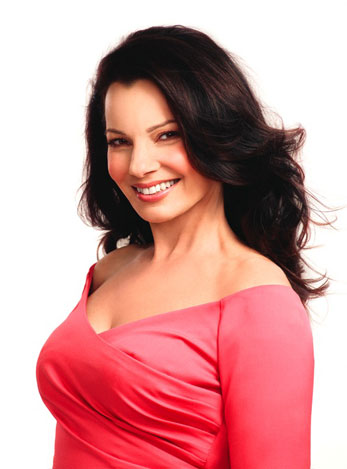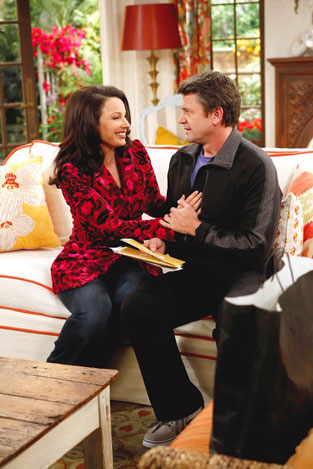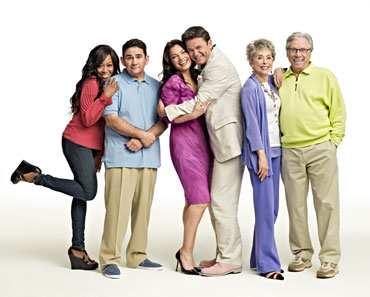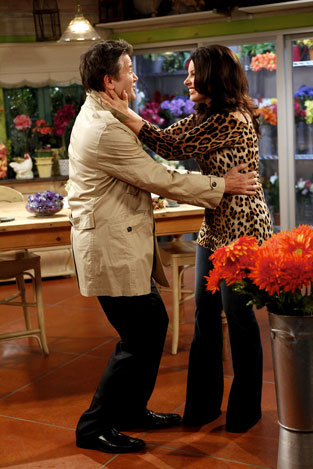In January of 1985, intruders broke into the Los Angeles home of Fran Drescher and Peter Marc Jacobson. Drescher was raped, while Jacobson, held at gunpoint, was forced to watch.
"It was a traumatic experience," says Jacobson, softly. "Thank God we lived through it, that nobody was killed. But after that, we were both in not great shape and went into therapy."

Fran Drescher
That's when things slowly started changing, specifically for Jacobson. "In therapy, everything came out in my head that was bothering me," he says.
And what was bothering him, it turns out, was a long-dormant attraction to men.
Some years later, Jacobson informed his wife – and business partner (the two produced Drescher's hit series The Nanny for CBS) – that he was bisexual.
"I wasn't looking to be with a man," Jacobson recalls. "I just wanted to let her know what was going on in my head. We went on with our marriage. But when you keep burying something, eventually it comes up in ways that are destructive, such as being controlling.
"What killed our marriage was that I wasn't at peace with myself."
When The Nanny ended its successful seven-year run in 1999, Jacobson, already separated from Drescher, moved to New York. The couple eventually divorced.
In 2000, Drescher fought a battle with cancer – and ultimately won – but a horrific experience with the medical community fired up her inner-activist. A resulting book about her experience, Cancer Schmancer, was on the New York Times bestseller list for months in 2003.
"When I started writing Cancer Schmancer," says Drescher, "I felt very betrayed by the medical community and I was quite bitter. I had to write four drafts of the book before I really struck the funny bone and found my voice. With each draft, I emotionally began to heal."
In 2007, Drescher officially launched the Cancer Schmancer Movement (cancerschmancer.org), a nonprofit organization dedicated to ensuring people, particularly women, are diagnosed while the disease is still in its earliest, most potentially curable stage. Her fervent activism on behalf of prevention and early cures have defined, in part, Drescher's recent life.
Even more recently, life came full circle for both Drescher and Jacobson, who joined forces to produce a show for TV Land, which, a few years ago, entered the realm of creating original, old-style sitcoms that trade on nostalgia while deploying a modern sensibility. The network's biggest hit, Hot in Cleveland, is a sterling example of the format when it fires on all pistons.
"TV Land has a very good strategy," says Drescher. "They built the network with an audience that loves sitcoms and were willing to tune in to watch repeats. And then decided to leverage it and start building a new franchise with current programming that later can be syndicated."
"Fran had a meeting with TV Land to pitch some ideas for some shows," recalls Jacobson. "They said, 'If there's something you were to do what would it be?' And she said, 'Oh, that would be about me and my ex-husband who is now gay.' And then she started to pitch other ideas and they said, 'Don't bother, because we just bought that one.'"
The resulting sitcom, Happily Divorced, starting its second season Wednesday, March 7, stars Drescher as Fran Lovett and the superlative John Michael Higgins as her recently out ex-husband, Peter. On the show, the characters remain friendly and supportive of each other, all the while intruding on the other's personal life for maximum comedic irritation.
Drescher is beyond thankful that Higgins, a straight actor known for his work within the Christopher Guest improv ensemble, accepted the role.
"John really wasn't interested in playing gay parts, until this part came along," she says. "The idea of playing a man that, at 45, comes out and has lived his whole life up until then as a straight man, and is just learning how to integrate into the gay community, was fascinating to him."
"The whole journey of Peter is that he comes out in his 40s," adds Jacobson. "When I came out and went into a gay bar, I didn't know everything. Somebody called me 'Daddy' and I said, 'Wha-?' And a friend said, 'That was a good thing, don't worry.' I had to learn it all.
"[The character of] Peter is totally oblivious and uncomfortable and he's figuring it out. The first season, he dressed a little more nerdy and stuff because he wasn't exposed to it yet. He'd never been into a gay bar. And now he's beginning to pick up all the things that a lot of gay men do who live in West Hollywood."
Last season's Happily Divorced featured several familiar guest stars, including an uproarious, sexually charged turn from Drescher's former Nanny co-star Charles Shaughnessy. This season, Jacobson hints, will have its own share of special guests, including an appearance by Morgan Fairchild on the season premiere.
He also reveals, a trace of mischievous glee in his voice, that "in the first show, the last scene we have a little exposure of Fran than has never been seen on television before. That's all I will say. And you're the first person that knows this – because we literally got the clearance for it 10 minutes ago from 'Standards and Practices."
"I love working TV Land," croons Drescher. "I feel very blessed in this economy to be able to keep working in the craft that I love, and inviting people into the Lovett home every week. And hopefully at the same time exposing people to opening their minds and hearts to the normalcy of being gay."
METRO WEEKLY: Let's start with your life growing up in Flushing, N.Y.
FRAN DRESCHER: I grew up in a middle class, provincial part of Queens in the '60s and '70s. I had two loving parents, and I have one older sister. I always wanted to be in show business. I always had aspirations to live a life bigger than the one I knew. I liked things I saw in the movies and on TV and aspired to attain those things and realize my creative talent. And I think I was like I am now: sometimes funny, always intelligent and ambitious.

MW: The first time I encountered you was in the movie This Is Spinal Tap, where you unforgettably portrayed publicist Bobbi Flekman. When The Nanny emerged in the '90s, I watched it religiously. It was one of the first times I'd ever felt such a powerful connection with a Jewish character on television.
DRESCHER: TV is such a fast medium that when you're writing, executive producing and starring in a show, the closer you can play a character to yourself – or something that you're extremely familiar with – the more rich the character's going to be, and the less of a broad stroke its characterization is. When we were still writing the pilot script for The Nanny, the network wanted the character to be Italian. And I said, ''We can't write that. We don't know that, it's gonna come out too broad. It's not going to have the specificity and richness of detail that I can bring to the show if Fran is Jewish.'' I really dug my heels in on that, even though this was a big break and I needed the break. But I wasn't gonna do it wrong.
MW: The show worked well because you stayed honest to who you were. You created an identifiable bond with the audience.
DRESCHER: A lot of people bonded with the character [of Fran Fine]. In fact, it was very surprising to the network, especially, that the show was so lovingly embraced by the Sun Belt, the Midwest and throughout the world – including very unlikely places like Saudi Arabia and Egypt and Jordan and the Emirates republic – so much so that the Knesset in Israel honored me for transcending political borders with humor as a strong Jewish character.
MW: Why do you think that happened?
DRESCHER: Different places, different cultures, different reasons. But I think everybody understands working class versus aristocracy.
MW: There was also a lot of warmth and love conveyed in that show.
DRESCHER: I like doing shows about love. And the global message in Happily Divorced is love as well.
MW: Happily Divorced is based on your life.
DRESCHER: It's certainly inspired by my life.
MW: You and Peter were married for how long?
DRESCHER: We got married in '78, and got divorced in '99.
MW: How did he come out to you?
DRESCHER: About two-thirds of the way through the marriage, he told me he thought he was bisexual, but that he'd never acted on it. He felt that he had an attraction to men, but he wanted to live his life with me. He loved me and he loved our life. I eventually left because I felt very suffocated in the marriage and unhappy. Two years after we divorced, he came out to me. He didn't even say he was gay. He just said, ''I started dating men.''

Cast of ''Happily Divorced''
MW: How did that feel?
DRESCHER: Relief, because I'd felt guilty that I left him. He didn't want the marriage to end. He was very upset and felt very abandoned and alone, and was very angry with me. When [The Nanny] ended, he moved to New York – he couldn't get far enough away from me. So I felt very guilty. I was already in love with a man 16 years my junior, living my life.
Then I got diagnosed with cancer and our manager – we have the same manager – called him. As soon as she told him, he burst into tears, and in that moment all of his anger melted away. All that was left was the love, and he wanted to come and be by my side, but I already had somebody and I wanted to be with that person.
But we began to rebuild our friendship and to try to reinvent ourselves. And in the 13 years since the divorce, we've managed to completely find each other as best friends and soul mates again.
MW: Has Happily Divorced been cathartic for the two of you?
DRESCHER: In ways you might not expect. We miss the house we used to live in together, so we sort of copied that for the house that the couple lives in. We get to see each other every day and be creative together and revisit our relationship and reflect back on the way we were. So I think it is cathartic. Being creative and writing about what you know, especially if it's something that is inspired by your own personal experience, is really a wonderful, wonderful ride to take. It's illuminating. We're really loving it.
MW: In all those years, how did you not sense that perhaps you were with a man who might be gay?
DRESCHER: Here's the thing: We met when we were 16. We didn't have a lot of experience. We loved each other. We had a great friendship. We made each other laugh and we had an active sex life. And he was in show business, he was an actor, he was musically inclined and the metrosexual was in vogue. So I guess you see what you want to see.
MW: Looking back over that part of your life, do you have any regret?
DRESCHER: Regret about what?
MW: Well, for instance, when you're with somebody for so long and then it ends, for whatever the reason, do you have any regret that it continued for as long as it did?
DRESCHER: I think I might have felt that way at one point early on. You know, when did he figure this out? Was it walking down the aisle marrying me and thinking he was gay? But I think it's unhealthy to look back with any regret. Still, something that we've explored comedically in the series is that Fran blames Peter for robbing her of her youth. Now here she is middle-aged out in the meat market.
MW: In 2000, you learned you had uterine cancer. But you were misdiagnosed for years before they even arrived at that diagnosis.
DRESCHER: I was on a two-year, eight-doctor odyssey in search of a proper diagnosis. Everywhere I turned, somebody had something else to say, but nobody knew I had uterine cancer. And by the grace of God, even after all that time, I was still in stage one, which is the most curable stage for cancer. A radical hysterectomy cured me with no post-op treatment, only follow-up doctor visits.
MW: Your experience caused you to lose faith in the medical community.
DRESCHER: Most definitely. And it caused me to become a medical consumer, and start a women's health movement, and become empowered to take control of my body, and understand that doctors are not gods. When the doctor calls and tells you, "You have cancer," at the end of the day he goes home and eats dinner with his family, while you go home and eat your heart out with yours.
It's really important to not put your head in the sand and be an ostrich when you feel those early warning whispers, because it could be cancer when you feel something happening. And you wanna capture it at its earliest onset when it's most curable. If everybody was diagnosed in stage one, 95 percent of the people would live. The reason why we lose loved ones to cancer is almost always because of late-stage diagnostics, which is unconscionable in this time that we live in. But because people are fear-driven and they don't wanna know if something's wrong with them, because doctors are bludgeoned by big business health insurance to go the least expensive route of diagnostic testing, because we have a nation where so many people are uninsured or under-insured, it creates a very dangerous cocktail. And this is what I'm trying to change with the Cancer Schmancer Movement.
MW: Many of our readers are lesbians – and lesbians sometimes deal with cancer issues differently.
DRESCHER: I speak out to the lesbian community all the time, because they actually are not as good about taking care of their female reproductive organs or breasts, as a general rule. That needs to change. Being a lesbian does not preclude you from dealing with women's health issues.
MW: How do we turn that around?
DRESCHER: Well, I think it's consciousness-raising. You know, "Each one teach one."
MW: Currently, there's controversy swirling around the Susan G. Komen Foundation. Any thoughts on that?
DRESCHER: There are many, many organizations out there that people can support. Komen is one of them. They were a pioneer in raising breast cancer awareness and galvanizing and taking breast cancer out of the closet, where you don't have to speak about it in hushed tones, and getting Capitol Hill to get the conversation going. So I think that they've earned a place in our society.
However, Cancer Schmancer is a very lean, mean organization that is not really rich at all. And I used to be jealous that we didn't have the kind of money that Komen has – not even close. But now I see that we can maneuver more nimbly because we're not such a big bureaucracy. And we can get things done more effectively at the scale that we're at – with a celebrity at the helm. And so I think that to everything there is a purpose under heaven.
MW: What do you think of ''Obamacare''?
DRESCHER: I'm very happy that it got passed because now it exists. It's not a perfect document, but what is? Like our Constitution, which is always, as you know, having amendments added to it, so will this. But you gotta start. You can't begin with a perfect document. You do the best you can, you get it on the books, and then you let the people and Congress keep improving it. Even though three-quarters of the stuff hasn't even been implemented yet, I already see a change in attitude from big business health insurance who are becoming more prevention-oriented, which is so important.
All the nations that provide health care for their citizens are much, much more prevention-oriented than we are and this is something we have to start changing. We are transfixed on closing the barn door after the horse escapes, trying to find a cure for the sickness, because big business pharma stands to make money off of sick people promising them that you can live longer sick. But where's the cure?
One out of two men and one out of three women will get cancer in their lifetime – and that's too much. We're on a slippery slope towards our own demise. One out of two men! That's crazy. The children of today for the first time in U.S. history are predicted to not live as long as their parents lived. And the babies are already being born pre-polluted with 200 to 300 chemicals in the mother's umbilical cord. American women's breast milk has the highest amount of flame retardant in it from any women on the planet. So we are right now functioning like a virus on this planet. We are just destroying everything in our path that actually supports life until we're going to kill ourselves. That's what we're doing.
MW: The Republicans seem determined to dismantle Obamacare, to do away with it completely.
DRESCHER: They want to do away with Obama. The parties are so biased that they're completely unwilling to give kudos where deserved. They're going to make everything he's accomplished seem evil.
I live in this great nation. If I get robbed, I want a policeman to come and help me. And if I get in trouble, I want an attorney to come and help me. And if my house goes on fire, I want a fireman to come and put it out. And if somebody attacks my country, I want a soldier to protect me. And if I have a kid, I want that kid to be educated, not illiterate. And if I get sick I want a doctor to cure me. I think that that's our right as American citizens.
This all costs money. Everything costs money. And the very people that are dishing Obama – who's actually stuck his chin out against Wall Street, against the banks, all these people who have proved to be greed mongers – he may have lost a lot of support from those people. I don't think he's lost support from the everyman, the working bloke, but when you look at the benefits that the politicians who are trying to revoke Obamacare have – paid by the citizens – it's such a hypocrisy. And unfortunately the people that they are driving fear into may not have the political savvy to question those obvious hypocrisies.
MW: You were a big Hillary Clinton supporter leading up to the 2008 campaign. So I'm curious: Are you happy with the job Obama's done?
DRESCHER: I am happy with the job he's done. I think he's done a yeoman's job. He came into a nation that was at the depths of despair, and it got worse before it got better. A lot of people think that the money that was spent to try and resolve the financial crisis put us deeper into debt, but I think what they don't really realize is that very, very smart financial analysts looked very long and hard at what was done wrong during the crash of '29, when we experienced bread lines everywhere and much higher unemployment. And they made a bold move. As a result, more businesses didn't go belly up, more people didn't become unemployed.
It's not to say we're not struggling. But at the end of the day, I think that the hard decisions that he's made were the correct ones. Even though, you know, sometimes choices are just "What's the lesser of two evils?" or, "How do we do the best damage control? We're not going to fix the problem overnight." I think that that's how they approached the problem, and I think they did a good job.

Peter and Fran on ''Happily Divorced''
MW: You should run for office.
DRESCHER: I've been told that many times. And I think that it is on the horizon, but right now I feel like I have the forum to speak publicly without being thrown to the wolves.
MW: It would be fun to say ''President Drescher.''
DRESCHER: [Laughs.] Oh, well, yes it would!
MW: You'd be the first Jewish president.
DRESCHER: Not to mention woman.
MW: Plus you could re-marry Peter, and we'd have a gay first husband. Speaking of marriage, one of the things you are about to do is to marry several gay couples in New York on March 6.
DRESCHER: Yes, I'm officiating three gay weddings.
MW: So what does the idea of gay marriage mean to you, personally?
DRESCHER: It's an opportunity for the nation to grow and further realize the American dream to mature, and raise consciousness by continuing to strive to live up to the promise of liberty and justice for all. It's a civil liberty issue. And I think it's important for that reason. You know, we're always trying to mature, and I think that this is an opportunity to do so. I think that we are at our best as a nation when we can inspire the world like the beacon of freedom that we are. That means that we have to continue to uphold that standard and keep demanding more of ourselves. I think that that's what makes this nation great and so important to the world.
MW: Do you think that, overall, the country will come around on the subject?
DRESCHER: Absolutely no question. The majority of people under a certain age see nothing wrong with [marriage equality], so it's a generational thing that is going to ultimately fade out. But hopefully, more and more people and states will come to realize that love is love, and everybody has a right to live an authentic life. Everybody has a right to marry the person that they love in a traditional way.
MW: And what about you? Are you still involved?
DRESCHER: I recently broke up, and now I'm single. So if you know somebody, they have to have the "Five S's" – sexy, successful, smart, single. And straight!
The second season of Happily Divorced premieres Wednesday, March 7, at 10:30 p.m. (EST) on TV Land. Check your local satellite and cable listings.
Learn more about Fran Drescher's Cancer Schmancer Movement at cancerschmancer.org.
...more